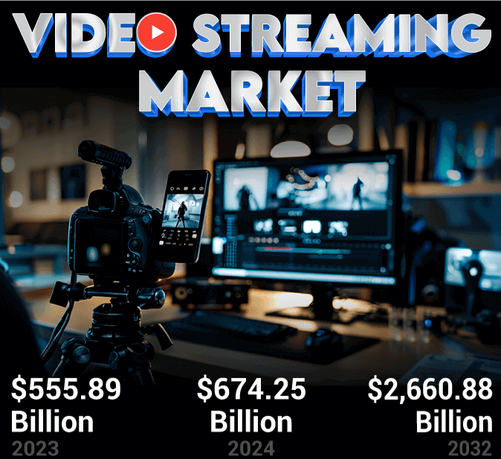Instagram’s age-verification identified a moustachioed adult as over 16 – but how did it go with a 13-year-old? https://www.theguardian.com/australia-news/2025/dec/01/instagram-age-verification-u16-social-media-ban-australia-moustache #Socialmediaban #Australianews #Digitalmedia #Socialmedia #Instagram #Meta
#digitalMedia
🎥 Global Video Streaming Market Outlook (2024–2032)
The video streaming market continues to expand at a rapid pace.
Valued at USD 674.25B in 2024, it is expected to reach USD 2,660.88B by 2032, supported by a strong CAGR of 18.5%.
📶 Streaming has become the backbone of modern media consumption—driven by personalization, mobility, and cloud infrastructure.
#VideoStreaming #OTT #DigitalMedia #StreamingPlatforms #TechTrends #EntertainmentTech #MarketInsights
#NowWatching “Dark Habits” (1983) on The Criterion Channel
Blu-Ray: https://amzn.to/4aiGDwU
Written & directed by Pedro Almodóvar
Starring Cristina Sánchez Pascual, Will More, Laura Cepeda
A nightclub singer seeks refuge with gay nuns on dope in a Madrid convent.
I’m excited to announce that my book, Religions Are Remixes, will be released in paperback later next month! Available for preorder now! https://www.routledge.com/Religions-Are-Remixes-Rethinking-Originality-Authenticity-and-Authority/Walker/p/book/9781032680057 #religion #remix #religiousstudies #remixstudies #remixtheory #digitalmedia
Took a chance on an international belt maker and it paid off big.
My review of the TNA Digital Media Championship replica is now live!
Surprised at the quality, the communication, and the 30-day turnaround.
🎥 https://youtu.be/S0dAmsJ04KI?si=n2078ccEk97zgUhN
#Wrestling #TNA #ImpactWrestling #ReplicaBelts #Digitalmedia #BeltCollectors #ProfessionalWrestling #Fan
How to support your child through the social media ban – listen, be on their side and don’t try to justify the new rules https://www.theguardian.com/australia-news/2025/dec/01/how-to-support-your-child-through-under-16s-social-media-ban-australia #Parentsandparenting #Socialmediaban #Digitalmedia #Lifeandstyle #Socialmedia #Family
#NowWatching “The Photographer of Mauthausen” (2018) on Netflix
Blu-Ray:
Directed by Mar Targarona
Starring Mario Casas, Richard van Weyden
Based on real events, Francesc Boix is a Spaniard inmate in the Nazi concentration camp of Mauthausen in Austria who tries to save the evidences of the horrors committed inside its walls.
#DigitalMedia #streaming #ad #antifa #nazis #WWII #pow #evil #NeverAgain #history #Spanish
Small changes to ‘for you’ feed on X can rapidly increase political polarisation https://www.theguardian.com/technology/2025/nov/27/partisan-x-posts-increase-political-polarisation-among-users-social-media-research #Digitalmedia #Socialmedia #USpolitics #Technology #Worldnews #Internet #ElonMusk #USnews #Media #X
Africa: News Influencers Are Reshaping the Media - Insights From Kenya, Nigeria and South Africa: [The Conversation Africa] News creators and influencers have become increasingly important sources of news as more people turn to social media and video networks like Facebook and YouTube to inform themselves. By news creators, we mean individuals who create and distribute content mainly through social and… http://newsfeed.facilit8.network/TPVyS7 #Africa #NewsInfluencers #SocialMedia #ContentCreators #DigitalMedia
I’m always on my phone, my girlfriend would rather communicate via woodland creatures. Somehow we make it work | Rebecca Shaw https://www.theguardian.com/commentisfree/2025/nov/28/always-on-my-phone-online-girlfriend-offline-we-make-it-work #Relationships #Digitalmedia #Mobilephones #Socialmedia #Smartphones #Internet
https://get.mypost.to/ldWT9k
The Petersen Automotive Museum recently received the Digital Media of the Year..
#socialmedia #petersenmuseum #digitalmedia #beverlypress
NowWatching “30 Minutes or Less” (2011) on Apple iTunes
Blu-Ray: https://amzn.to/48kMmQi
Directed by Ruben Fleischer
Starring Jesse Eisenberg, Danny McBride, Aziz Ansari
Two fledgling criminals kidnap a pizza delivery guy, strap a bomb to his chest, and inform him that he has mere hours to rob a bank or else...
AI in journalism and democracy: Can we rely on it?
#Tech #Politics #AI #Journalism #MediaEthics #Democracy #GenAI #ForeignAffairs #Misinformation #DigitalMedia #TechAccountability #NewsIndustry #ArtificialIntelligence #The14 #The14Media
https://the-14.com/ai-in-journalism-and-democracy-can-we-rely-on-it/
#SpeakingOutOfPlace welcomes #OmarZahzah to discuss his book #TermsOfServitude: Zionism, #SiliconValley, and Digital / #SettlerColonialism in the #PalestinianLiberation Struggle
#Palestine #PalestineSolidarity #media #digitalMedia #socialMedia #mediaCriticism #tech #BigTech #censorship #digitalCensorship #cyberharassment #digitalRights #digitalActivism #Gaza #oPt #books @bookstodon
AI chatbots are encouraging conspiracy theories – new research
#Tech #AI #ChatGPT #Chatbots #ConspiracyTheories #Misinformation #AIMisinformation #TechSafety #ElonMusk #DigitalMedia #Research #AIEthics #Google #OnlineSafety #MediaLiteracy #AIChatbots
https://the-14.com/ai-chatbots-are-encouraging-conspiracy-theories-new-research/
YouTube Remains the Most Widely Used Social Platform as Usage Patterns Shift Across the U.S. https://www.boldoutlook.com/pew-social-media-usage-2025-youtube-facebook-tiktok-instagram-trends/
#youtube #facebook #socialmedia #digitalmarketing #digitalmedia
AudFree's Black Friday sale offers massive discounts up to 60% on digital media tools. Capture Netflix videos, save music from streaming platforms, and transform your multimedia experience. Don't miss this limited-time offer! #DigitalMedia #BlackFriday
While some fret about newsletter fatigue, Beehiiv's CEO Tyler Denk is doubling down, expanding their platform. Is there endless room for more in your inbox, or is the bubble about to burst? What's your inbox's current breaking point?
#NewsletterTech #DigitalMedia #Startups #TechDebate #Beehiiv
https://techcrunch.com/2025/11/23/beehiivs-ceo-isnt-worried-about-newsletter-saturation/
Bro boost: women find LinkedIn traffic ‘drives’ if they pretend to be men https://www.theguardian.com/technology/2025/nov/22/bro-boost-women-find-linkedin-traffic-drives-if-they-pretend-to-be-men #Digitalmedia #Socialmedia #Technology #LinkedIn #Gender #Women
‘Agony uncle’ Bill Nighy leads rise of the celebrity podcast https://www.theguardian.com/film/2025/nov/21/bill-nighy-leads-rise-of-the-celebrity-podcast #Television&radio #Digitalmedia #Podcasting #BillNighy #Podcasts #Internet #Culture #UKnews #Media #Film





